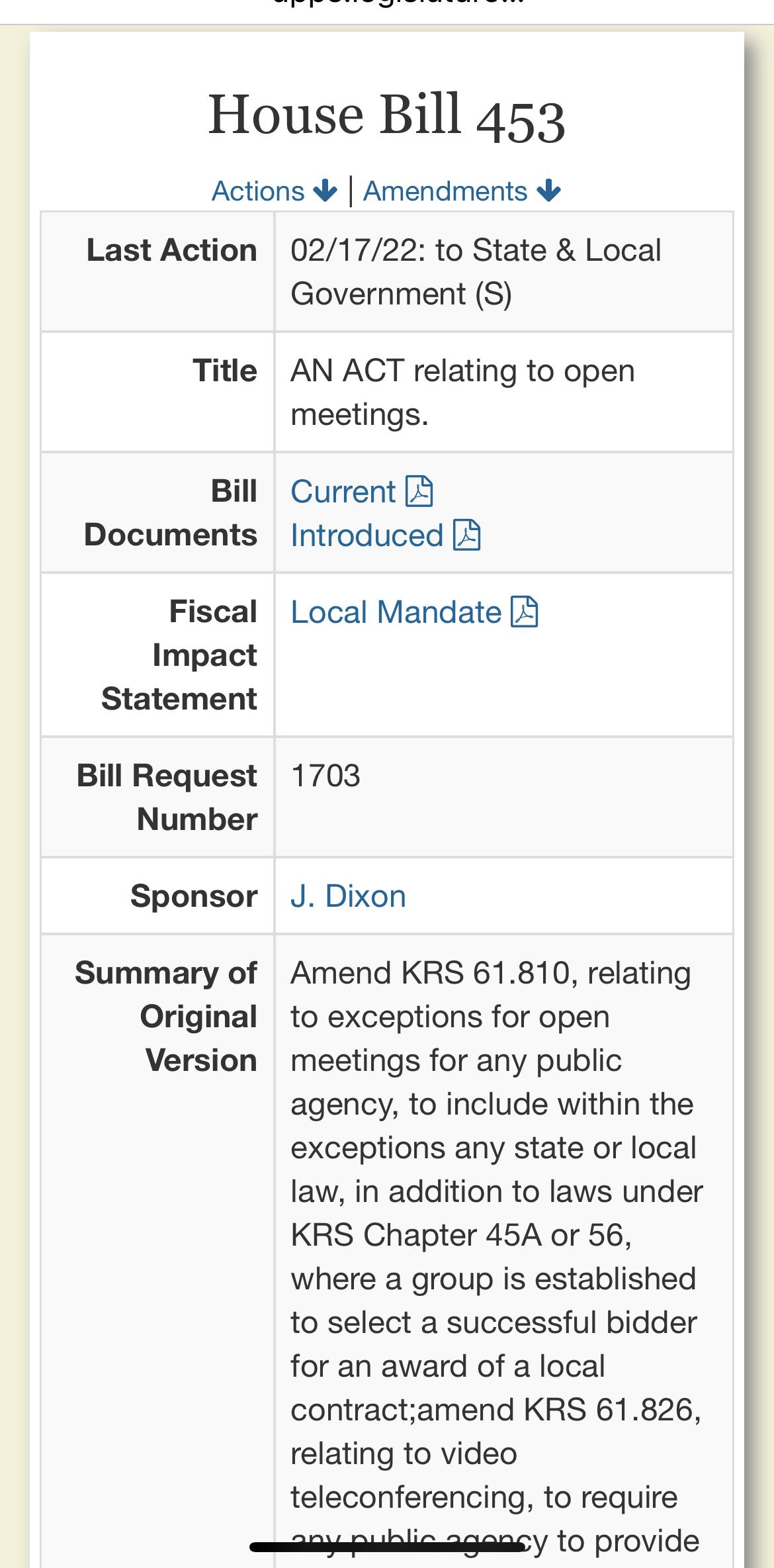
Kentucky is flirting with the disaster described in this Chicago Tribune op-ed:
HB 453, a facially innocuous bill that permanently codifies the right of public agencies to conduct meetings by video teleconference.
https://www.facebook.com/1846598708/posts/10216740882034867/?d=n
https://www.facebook.com/419650175248377/posts/1072965376583517/?d=n
https://www.facebook.com/419650175248377/posts/1068750800338308/?d=n
https://www.facebook.com/419650175248377/posts/1075330606346994/?d=n
The Kentucky Open Government Coalition continues to oppose HB 453 based on the failure of the General Assembly to impose guardrails on video teleconferenced meetings as well as its failure to consider codification of the hybrid option. The potential for abuse is nearly limitless.
https://apps.legislature.ky.gov/record/22rs/hb453.html
Bryan Zarou, director of policy for the Better Government Association, writes:
“Illinois Gov. J.B. Pritzker’s 27th disaster declaration regarding COVID-19 is set to end. In many respects, life will go back to normal. This includes in-person public meetings.
“But wait. Even as the pandemic winds down, towns and cities across the state are making a push in the state legislature to try to make their meetings too Zoom-friendly.
“Public squares, dating to ancient Greece, were areas where dialogue, protest and decisions took place on behalf of residents of their cities. The idea of heading to one location where people can see their elected officials, air their displeasure and even advocate for change is at the heart of any democracy. It should not be disrupted.
“In the emerging post-pandemic context, here’s what that means.
“There have been multiple attempts in the state legislature to try to slowly decimate the idea of the public square by moving to a primarily online video conferencing system.
“Video conferencing is not bad by definition. COVID-19 taught us that it provides access to people who find it impossible, or even inconvenient, to attend public meetings in person. From this point forward, online systems — on Zoom or similar platforms — should always be available for the benefit of those who can’t attend.
“But that’s as far as it should go. Virtual connections cannot be a replacement for in-person meetings. Our elected officials should be mandated to meet in their city halls or other public buildings — as they have since the founding of the republic. There they can be seen, just like in ancient Greece. And the people can be heard.
“Access to elected officials by citizens and journalists helps hold governments accountable. Former longtime University of Illinois at Chicago professor Dick Simpson, a former alderman, experienced this as an elected official. “At in-person gatherings, the public can approach public officials, give them documents or evidence, and discuss possible alternatives to the actions being proposed in ways that are not possible remotely,” he said in an interview.
“Elected officials are put into office to make tough decisions. Sometimes they need to hear the ire or encouragement of those they represent. If they never hear from, interact with or even see their constituents, they will grow out of touch and ineffective.
“‘Democracy depends upon the possibility of deliberation,’ Simpson said. ‘Observation is helpful, and technology allows more people to see government at work, but it should not be the only way citizens can interact with their elected officials.”
“Think of the public meeting as a connective tissue between the people and their public officials. If we allow meetings to be replaced by their all-digital alternative, the connections will dry out and break apart.
“We all understand that holding elected office in Illinois is a part-time job for all but a handful of officials. In many cities across the state, there is no pay or only modest stipends. Sacrifice is the cost of serving, the price officials pay for the power and impact they are able to gain. Even so, the responsibility of representation is nonnegotiable, and that includes appearing often in person, and very infrequently via Zoom.
“Although Zoom has made public meetings more accessible for members of the public who can’t attend, it should be the norm for those who want to hear and add to the public discourse. It should not be a way for elected officials to avoid the public or controversial votes. It was true in ancient Greece and should remain the case in Springfield and City Hall.”


